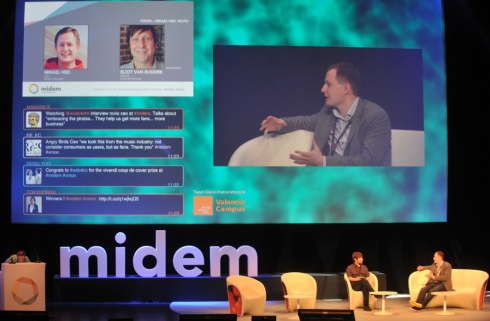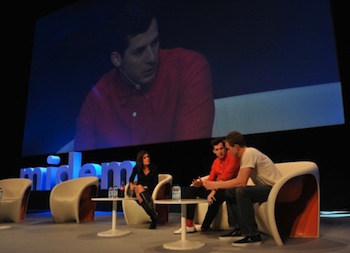

Angry Birds developer Mikael Hed was interviewed by Evolver.fm’s Eliot von Buskirk, and discussed how he tackles piracy. “We could learn a lot from the rather terrible ways the music industry has tried to combat piracy,” he said.
Yesterday (1/30) was “Visionary Monday” at MIDEM, offering a day of discussion about the music industry’s past, present and future. The recurring mantra was that the digital world requires an entirely new way of thinking and new set of actions that are a sharp break from the past.
Topspin’s Ian Rogers kicked off the day, explaining that “there’s only two kinds of people in the music business—people who make music and people who love music. Everybody else is in the way unless they provide value.” The theme of providing value resonated throughout the day.
The first speaker was Kevin Roberts, CEO of Saatchi and Saatchi worldwide, who kicked off events with a full-on blast of energy. He opened by stating, “I haven’t a clue about the future of music or advertising. Our agency has stopped doing strategic planning because the world is VUCA—which stands for Volatile, Uncertain, Complex and Ambiguous.” He added that VUCA can also mean “Vibrant, Unreal, Crazy and Astounding” and that “rational thinking leads to meetings while emotional thinking leads to action.” The era of enhancing shareholder value as the main goal is over he explained. Return on Investment has been replaced by Return on Involvement. “You should not be driven by a vision but by a dream, [we have moved] from information to inspiration.” The three questions that must be answered for a product to be successful are (1) Do I want to experience it again? (2) Do I want to share it? and (3) Do I want to improve it?
Apps at MIDEM
Next, MIDEM Awards for app creation were presented to MPME, which curates radio; Crowdsurfing, which allows fans to enjoy concerts online with friends; Wildchords, which teaches guitar; and Webdoc.
Michael Hed, whose company Rovid created Angry Birds, said he caters to “fans, not users” and that he sees television as the new area for apps. Angry Birds is the most downloaded app in the history of the iPhone. It has been downloaded over 500 million times and will be available on Facebook in a few weeks.
MIDEM’s Music Hack Day allowed 150-200 attendees to “geek out” for 24 hours creating apps. Several apps were demonstrated and it was noted that these “hack days” are growing in popularity.
Future of Music Coalition Study
Kristin Thomson presented the Future of Music Coalition’s study on musician revenues. The organization surveyed over 5,000 musicians in a wide variety of genres and discovered that 42 percent made all of their income from music. Only about two percent of their income came from merchandise sales. However, the study seemed skewed because a number of classical players were included, and they have no income from merch.
Of the artists surveyed, 10 percent received income from grants, five percent from fan funding, four percent from sponsorships, three percent from acting, and two percent each from web ads and endorsements. The income generated by musicians was connected to their “brand” and the report stated that “corporate sponsorship and fan funding has replaced monies that used to come from record labels.”
The next panel, “Ideal Routes to a Sustainable Music Career,” included James Barton, artist manager and owner of The Blue Team (UK); cellist Zoe Keating (USA); Paul Van Dyke, artist, DJ and producer; Simon Wheeler, director of Digital for Beggars Group (UK); with moderator Jeremy Silver, CEO of Mediaclarity (UK). This was a lively discussion that raised the question “Do today’s artists need a manager?” The consensus was that if the manager can add genuine value and grow the overall business he/she is valuable.
James Barton noted that managers have taken on many duties once performed by the labels, in the wake of staff and budget cuts at the labels. Simon Wheeler added that revenue from streaming music “is an increasingly important part of the revenue stream, but at this time it alone could not sustain an artist’s career…There’s never been a single thing to sustain an artist’s career.”
Mike Masnick, editor of the Techdirt blog, presented “A Totally Positive Look at the State of the Industry and Where the Big Opportunities Lie.” Masnick exhibited how “the sky is rising, not sinking, and there are more opportunities than ever before. We should be celebrating, because the industry is growing, not sinking. The amount of content is growing, it is easier to expose and monetize than ever before, the record companies are down but they’re not the whole music industry and the marketing challenge is to capture consumers.” See his full report at techdirt.com.

In a particularly packed and frank panel, producer Mark Ronson discussed making an Olympic Games track with Coca-Cola.
The afternoon session began with Ian Rogers interviewing Wendy Clark, Sr. VP of Integrated Marketing Communications for the Coca-Cola Company, and producer Mark Ronson who created a song for Coke for the 2012 Olympics in London.
The “Coca Cola Music” campaign approached Ronson about traveling around the world to capture the sounds of Olympic competitors and incorporate that into a song. Ronson recorded an arrow in flight and hitting a target, the sound of ping pong balls, and a runner’s heartbeat. Asked if a young act would refuse an opportunity like this because it could be perceived as “selling out,” Ronson stated “those days are long gone. I believe any act would be excited to be involved in something like this.”
Bas Grasmayer, head of Information Strategy for Zvooq in the Netherlands, presented a talk on “An Interconnected Ecosystem of Fans.” He showed there are “three realities of the digital age: music is not the product, there are varying expectations for price and product, and convenience is king.” He also noted that the student generation “learns ways to retrieve facts rather than learning facts.” He added, “We all love to be lazy…For those who are money poor and time rich there is YouTube; for those who are money rich and time poor there is iTunes.”
Lessons for Success
The debate on “How to Work With the Fab Four: Lessons for Success” was an incredibly lively discussion with moderator Ted Cohen, managing partner of TAG Strategic (USA); and panelists Charles Caldas, CEO of Merlin (Netherlands); Zahavah Levine, Director of Content Partnerships for Google (USA); Craig Paper, Director of Music Content Acquisition, Amazon (USA); and Rob Wells, President, Global Digital Business, Universal Music Group (USA).
Rob Wells stated that “the music market is still underserved because there are so many illegal downloads.” Charles Caldas noted that while retail outlets have gone from “mom and pops” to mega stories, the industry has done the opposite, moving from conglomerates to small independents.
Zahavah Levine of Google stated there are 250 million activated Android users with 700,000 activated each day.
Craig Pape believes the cloud should be “smarter and provide more opportunities. It’s a box and I’d like to see the box come to life and talk back.” Some panelists agreed the cloud is a “musical amnesty program” where users store illegal downloads. But despite this, Pape assured “it’s something consumers want and from an industry perspective, it is a good next step.”
Amazon’s Levine noted that negotiations with major labels have been difficult—one major label is not participating—and stated, “we have a great vision but we have to convince a lot of others who don’t have the same vision. [Sometimes] negotiations can go to the lowest common denominator, which can hurt the product.”
The issue of “tech” vs. “music” was a hot topic at MIDEM, with the consensus that “techies” don’t understand music and they don’t think “music” people bring much to the discussion. Problems arise when techies want to sell music but have no background in selling music.
UMG’s Rob Wells stated that “in a world of streaming services, physical product will be more important because it is high-end and more valuable…but it must be presented as a high-end product.”
On the final panel, “Understanding Marketing in a Networked Society,” Gerd Leonhard, CEO of The Futures Agency (Switzerland), moderated a panel that included Jon Cohen, CEO of Cornerstone Promotion (USA); Alan Moore, Founder of SMLXI (UK); and Kim de Ruityer, partner in Noise Inc. (UK).
Leonhard noted that “marketing starts when you remember who you are.” He also explained that “free gets you to the position where you can get paid.” Alan Moore, author of the book No Straight Lines, stated that “the only thing that counts in a non-linear world is communication.” He presented the four C’s: commerce, culture, communication and connecting.
Jon Cohen stated that “today’s consumer is an explorer and will seek out their passion. Sharing is the currency of the new world.”
Kim de Ruityer added, “Content is King, context is Queen.”
It was an exciting day, with ideas flying through the air. What emerged time and again was the idea that the “new” music industry requires an entirely new way of thinking that places the emphasis on the fan rather than the record label.

About the Author
Don Cusic is Professor of Music Business at Belmont University. He has authored 18 books, including his most recent “Discovering Country Music.”View Author Profile


